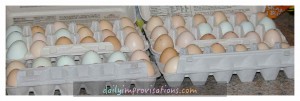You know how your kitchen looks like all those photos of kitchens in magazines? Keep that in mind when looking at photos of people’s chickens and chicken coops.
A lot is idealized in “chicken media.” Don’t get me wrong, I like my chickens more than I thought I would, but in order to really enjoy them AND take care of them, there are certain realities to be faced.
A friend asked for some tips for new chicken owners, so I had fun coming up with a list. It is for adult birds, which hopefully will be the phase you have your chickens the longest. Raising little chickies is it’s own subject. (click on any photo to enlarge.)
1. Chickens get things dirty quickly. You could spend a lot of time trying to keep their area or coop clean, but they don’t care and will have it filthy again within hours. Adjust your expectations.
2. As long as they have adequate space to run around in, a thick layer of straw a couple times a year is all you need for “litter.” Read Gail Damerow’s book Storey’s Guide to Raising Chickensto learn more about why it is actually probably not even good to clean up their area too often.
3. Chickens move a lot of dirt when they scratch. This means that they will accidentally dig out of enclosures unless the ground level borders are secure. It also means that free-range in your yard usually means your yard will turn into a compost heap. Don’t believe the photos about free-range chickens in well manicured landscapes.
4. Chickens can climb, fly, and roost. Either build an 8 foot fence to contain them or learn to trim their wings a couple times a year. They do not like having their wings clipped, but there are ways to get it done quickly and without hurting them, as my daughter teaches me in this video.
5. Chickens have a pecking order. There is nothing you can do about it.
6. Foxes, hawks, skunks, and raccoons hunt chickens. Finding food is a top priority for predators and they will dig into, climb over, and fly down to get your chickens. The chickens are particularly vulnerable when sleeping, since they are not easily roused from a sleep state. You will want them in lock down at night if you want to avoid losses. Some predators hunt in daylight, so you may have to secure ground level borders and have high, hard to climb fences. I have done everything from bricks dug into the ground around the border to a layer of wire as a perimeter.
7. Chickens are messy eaters. They spread the grain as they eat, which in turn attracts wild birds and mice. See here for our latest mousetrap.
8. Chickens are good at deciding what is safe to eat. You can give them scraps of almost anything. If they don’t eat it, they will scratch most of it into oblivion.
9. Chicken wire is fairly weak and not good for much, especially keeping out predators. It also gets torn pretty easily, so you probably want your main fencing to be something sturdier.
10. Sometimes chickens die and you don’t know why. It is part of having animals. (Here is something I wrote about what kids learn from caring for animals.)
11. Rolling around in the dust is one way chickens keep mites off of them.
12. When chickens molt, it is kind of ugly, but they are fine. They just might need a little extra attention to make sure they are warm if cold weather is involved, such as a draft free coop.
13. Chickens like fresh water.
14. Chickens don’t like the snow, but they can usually handle it and the cold if they have been raised in that sort of climate. They don’t need extra heat in their coop, especially if it gets closed up at night and they can share body heat.

15. Chickens will sometimes eat their own eggs. The main ways to avoid this are to make sure they have enough space, enough food, and collect eggs at least once a day.
16. Chickens like to go back to the same place to sleep every night. Start them off in the location you want them to call home.
17. One of the hardest things about having chickens in the winter is that the water freezes. There are a few options for avoiding that. This is what we do: How to Make a Heavy Duty Chicken Water Heater
18. Chickens need more calories in the winter to help them generate body heat and stay warm.
19. Chickens usually don’t lay eggs when stressed or in short day light conditions.
20. Some roosters stay “dormant” if they are not the head rooster. You may not know for years there is a secret rooster in your flock.
21. Chickens really do come when you say, “here, chick chick chick.”
22. They may be bird brains, but they can learn a routine and can be trained in simple ways.
23. Chickens will peck at anything that looks like a worm or bug. That includes toes and eyeballs. It doesn’t usually damage a person (my eyes have blinked fast enough when needed), but it can be quite forceful.
24. Chickens can be quite loud when laying an egg.
25. Chickens are easily spooked by sudden movements, loud noises, or any overhead motion.
26. Chickens are hard to catch if they get loose. They will get themselves trapped in dangerous places to avoid capture, risking ripping off wings or strangling themselves.
27. Don’t leave your dog alone with your chickens.
28. If a hen goes broody, she can be very aggressive about protecting her stockpile of eggs, even if they are infertile. She doesn’t know the difference.
29. There is no point in letting a hen brood eggs if there is not a rooster involved.
30. A rooster can be very rough on hens, especially if he doesn’t have very many.
31. Roosters can be unpredictably dangerous, flying at you with their spurs because you are wearing the wrong color, but some of them have more mellow personalities.
32. Roosters do not just crow in the morning.
33. How friendly a chicken is depends on both breed, type of care when it is growing up, and how safe it feels at the moment.
Raising chickens can be about as simple or complicated as you want it to be. The birds won’t really know the difference, unless they get stressed from too much intervention! As long as they have a few basics, they will enjoy a satisfying and productive chicken life, and then you can enjoy them.



